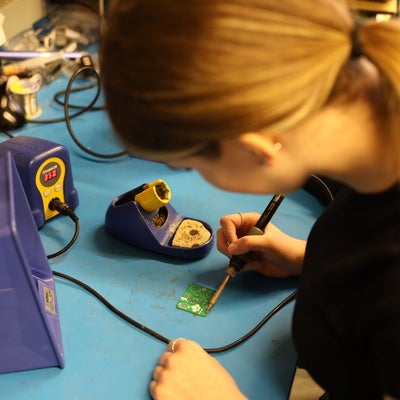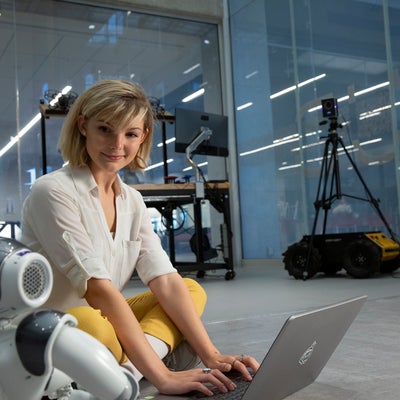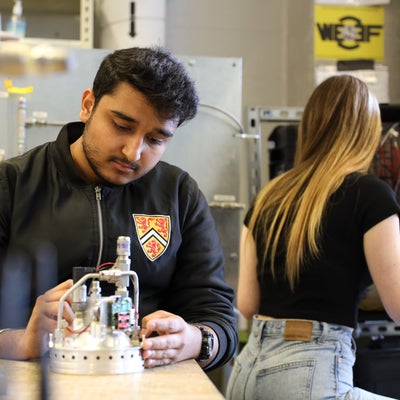Why Computer Engineering?
As a student in Computer Engineering you will learn about hardware, software and computing principles in the context of important devices and systems – systems that control phones, cars, planes and robots. Every automated device has a computer engineer who helped to create it.
Between labs and lectures, you'll gain experience with all aspects of computers, from chips and wiring to software, networks, and communications. You’ll graduate ready for a career as a software developer, hardware engineer, IT specialist, systems designer, and more, in a wide range of industries such as enterprise software, automotive, aerospace, automation and robotics, networks and databases, health care, and security.
Courses in Computer Engineering
You’ll take a mix of foundational engineering, programming, and mathematics courses in first year. After first year, most of your classes will be Computer Engineering courses covering topics such as communication systems, digital hardware, real-time operating systems, machine learning and AI, and analog control systems.
Sample first-year courses
This is a sample schedule. Courses are subject to change.
| 1A Term | 1B Term |
|---|---|
Upper year courses
For information about courses past your first year, check out the Undergraduate Academic Calendar.
Customize your degree with options and specializations
Options
Options are a way to provide you with a path to expand your degree and get a secondary emphasis in another subject or area. Students should decide if they are interested in taking options as they enter second year. Some available options are:
Specializations
A specialization is recognition of selected elective courses within your degree. Specialization offerings are unique to your engineering program and are listed on your diploma. Specializations that are available to Computer Engineering students include:
Co-op for Computer Engineering students
You’ll have an unrivalled opportunity to gain paid work experience before you even graduate. We’ll help you navigate job applications, résumés, and interviews; you’ll have the added benefit of trying out different roles and/or industries to find the one that fits you while building your work experience and reinforcing your in-class learning out in the real world. It all adds up to a competitive advantage after graduation.
Your first work term will be halfway through first year
| Year | September to December (Fall) | January to April (Winter) | May to August (Spring) |
|---|---|---|---|
| First | Study | Co-op | Study |
| Second | Co-op | Study | Co-op |
| Third | Study | Co-op | Study |
| Fourth | Study | Co-op | Study |
| Fifth | Co-op | Study | - |
or after first year.
| Year | September to December (Fall) | January to April (Winter) | May to August (Spring) |
|---|---|---|---|
| First | Study | Study | Co-op |
| Second | Study | Co-op | Study |
| Third | Co-op | Study | Co-op |
| Fourth | Study | Co-op | Study |
| Fifth | Co-op | Study | - |
There are two options for co-op sequences. You can request your preference if you receive an offer of admission. Learn more about co-op.
Example co-op positions for Computer Engineering students
- Software developer
- Hardware engineer
- Full stack web developer
- Data engineer
- Data scientist
- iOS developer
- Infrastructure engineering intern
- QA developer
Previous Engineering co-op student of the year
Rupa Vemulapalli, Computer Engineering student
- Recognized for her Winter 2020 term, Rupa Vemulapalli served as a junior energy analyst for Rushby Energy Solutions Inc.
- Pitched the idea of creating a revenue-generating iOS app, that will assist “Electric Vehicle (EV) suppliers quantify long-term gains in establishing EV-charging stations in designated locations.”
- Rupa successfully created a prototype for the app and was given the approval to continue developing the final product. The iOS app is now in the process of being placed in the App Store.
- Attended frequent site visits, reviewed energy audit reports, and evaluated building performance.
- Given the opportunity to represent Rushby Energy during a tradeshow that brings together energy experts.

Example careers for Computer Engineering graduates
- Firmware engineer
- Software engineer
- Network administrator
- Innovation technical lead
- Microprocessor design
- Robotics engineering
Capstone design projects in Computer Engineering
Capstone Design is the culmination of the engineering undergraduate student experience, creating a blueprint for innovation in engineering design.
Supported by numerous awards, Capstone Design provides Waterloo Engineering students with the unique opportunity to conceptualize and design a project related to their chosen discipline.
A requirement for completion of their degrees, Capstone Design challenges students teams to push their own boundaries, and apply the knowledge and skills learned in the classroom and on co-op work terms. It reinforces the concepts of teamwork, project management, research and development.
For a full list of previous capstone design projects, see our Capstone Design website.
Safety Lane (Capstone 2025)
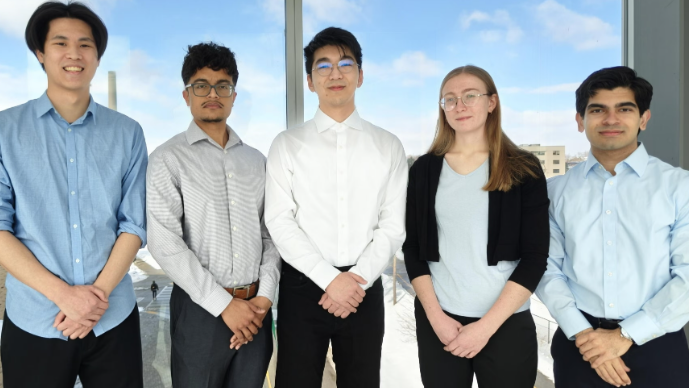
Hunnaan Arif, Eric Jeng, Jackie Treacy, Varun Akumalla Venkat, Gavin Zhang
The Safety Lane is an advanced robotics system that uses traffic cone robots to manage construction zone barriers remotely. The system leverages Bluetooth Low Energy to connect robots and the operator. In addition, Ultra-Wideband technology is used to ensure precise cone spacing. Operators can position and retrieve traffic cones using a mobile application, thereby reducing the need for construction workers to be near traffic and improving overall site management and safety.
SmartGrow (Capstone 2025)
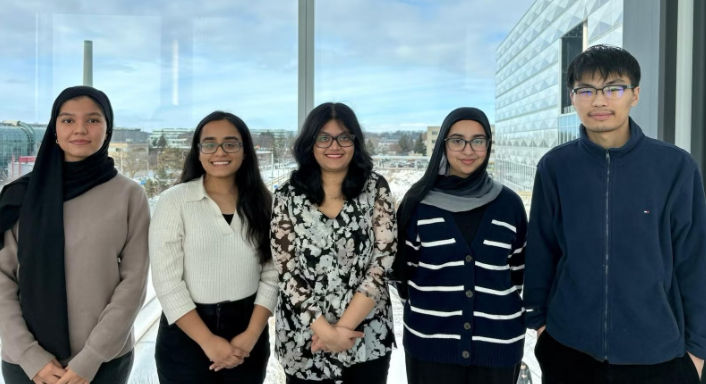
Labiba Iqbal, Nimrah Javed, Joanna Santhosh, Nashita Sattar, Gary Yang
SmartGrow is an autonomous greenhouse system that aims to mitigate premature plant death by optimizing growth conditions. It improves indoor plant survival rates and promotes healthier plant growth in a practical and user-friendly manner. Using image processing and convolutional neural networks, it identifies plants and optimizes lighting and soil moisture. Key features include automatic irrigation, ambient light control, and real-time monitoring on an LCD screen. SmartGrow integrates knowledge from image processing, computational intelligence, power electronics, and circuit theory for a user-friendly solution.
Student design teams
The Sedra Student Design Centre consists of over 20,000 square feet of space dedicated to design teams and student projects. There are more than two dozen design teams, all of which are student-led, and many of which represent Waterloo internationally.
Some examples include:
Electrium Mobility

Electrium Mobility is a student design team dedicated to building sustainable, portable, and electric transportation solutions in the form of electric skateboards, bikes, scooters, and other portable electric mobility options.
Waterloo Hacker Fab

Waterloo Hacker Fab is establishing Canada’s first open-source microchip fabrication lab, with all equipment engineered from scratch. Our goal is to develop reliable processes to build NMOSFET chips with a 10-micron gate length in a 24-hour turnaround.
Reality Labs

UW Reality Labs is a student design team at the University of Waterloo that specializes in XR (extended reality) and spatial computing. Our team offers students hands-on experience with cutting-edge VR and AR (augmented reality) technologies, as well as experimental spatial experiences.
Computer Engineering alumni
Ugo Landry-Tolzszcuk (BASc '09)

"I really liked all my co-ops because they were so varied. From ATI to working for JSI Telecom who built products for legal intercepts, to being at Research in Motion when the Apple iPhone came out."
Read more about Ugo's time in Computer Engineering.
Karim Al-Atrash (BASc '24)

"Waterloo gave me a chance to apply my learning within industries, ranging from highly technical robotics sensing to mass marketing of Internet of Things (IoT) devices.”
Read more about Kartim, valedictorian of his graduating class.
Brigette Lau (BASc '99)
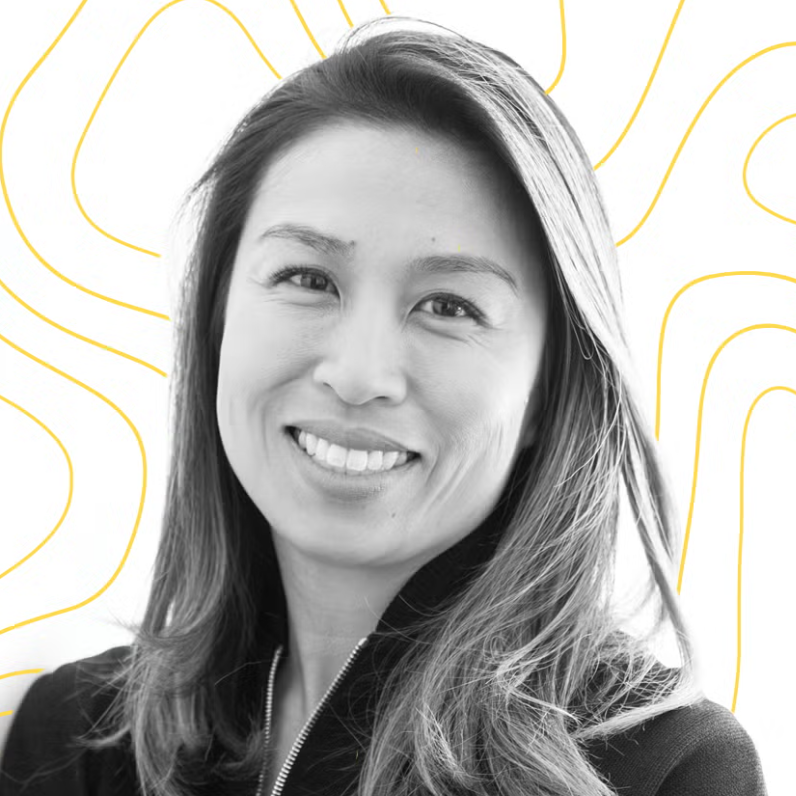
Brigette chose computer engineering at Waterloo for job security, but her path led to co-founding Firework Ventures — a journey shaped by unexpected opportunities and inspired by her roots.
Listen to Brigette tell her story on the Uncharted podcast.
Andrew J. Clinton (BASc '05)

Andrew received a Technical Achievement Academy Award for inventing micro-voxels. His ground-breaking work has had a tremendous impact on the way visual effects are done in movies today.
Read more about Andrew's work changing the movie industry.

